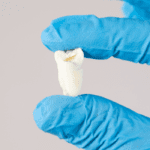People will first notice your smile. What happens if your teeth need minor treatment? A tooth veneer may be able to improve that. Veneers are an excellent option to correct various cosmetic and physical issues with your teeth.
Learn about veneers, what they are, how much they cost, and how to fit them.
What Are Dental Veneers?
Veneers, which are thin shells that match the color of your teeth, are attached to the front of your teeth to improve their appearance. They are often made from porcelain and resin-composite materials and can be permanently bonded to your tooth.
Dental veneers are custom-fitted mouth devices that help conceal or correct tooth damage, including:
- Discoloration and staining
- Chips and small missing pieces
- Tooth decay
- Crookedness
- Teeth gaps
While some people only receive one tooth veneer for a chipped or broken tooth, others get six to eight veneers to achieve a symmetrical smile. Usually, the eight top teeth are the most common veneers patients need.
What Are the Different Veneer Types?
Dentists often use porcelain veneers or composite resin, but they require extensive prep work. However, there are “no-prep” veneers that are applied differently.
Here’s an overview of the different types, including the process of getting veneers:
1. Resin-based Composite Veneers
Although they look similar to porcelain veneers, resin-based composite veneers can be more affordable and require less enamel to remove. Sometimes, the dentist does not need to remove enamel before placing the composite veneer.
Composite veneers are generally easier to replace than porcelain veneers if they become damaged or broken. Your dentist will cure the composite veneer using a special light. Additional layers of composite might be required to achieve the look you want.
2. Porcelain Veneers
They’re durable, thin caps. Your dentist can place porcelain veneers teeth on the sides and tops of the teeth. Dentists will first grind down your teeth, then make an impression to create a mold. After that, they will send the mold to the lab to create the porcelain veneer.
Other dentists might use CAD/CAM technology to design the veneer, allowing them to create the veneer in their offices. Porcelain veneers are the same color as natural teeth but can be whitened to brighten your smile.
3. No-prep Veneers
There are two types of no-prep veneers available: Vivaneers and Lumineers, which are particular brands of porcelain dental veneers. They require less time and are much easier to apply.
Instead of grinding layers of the tooth, no-prep veneers only affect the enamel of the teeth. No-prep veneers do not require temporary veneers or local anesthetics in most cases.
What Are the Pros and Cons of Veneers Teeth?
It is crucial to fully understand the pros and cons of veneers before deciding to get them. Now that you know the answer to “how do veneers work?” it’s time to weigh the advantages and disadvantages.
Pros
1. Whitens Your Smile Easily
Your teeth might look unattractive because of smoking, drinking coffee, and eating high-pigmented foods. You can bleach stained enamel at home or have it done by your dentist.
However, the enamel may stain again. Veneers for teeth might be the best option for you if you are looking for a simple way to whiten your smile. Veneers can withstand stains and are easy to whiten.
2. Fix Minor Cosmetic Issues
Veneers can correct minor cosmetic issues. Although your natural teeth may be slightly crooked or missing, no one will notice except you and your dentist. Veneers cannot always replace treatment done by an orthodontist.
3. Replace Worn Out Enamel
Although enamel is durable, it is not impervious to damage. Overzealous tooth brushing can cause enamel to become brittle. The enamel can also be eaten away by acidic foods, drinks, and other substances.
Your enamel can also be damaged by acid reflux disease. The loss of enamel is irreversible. Veneers for teeth are an excellent treatment for teeth that have enamel abrasions or enamel erosion.
Cons
1. Expensive Dental Veneers Cost
Based on where you live, the price of veneers can vary. Other factors include your dentist, the type of veneers, and the number of teeth you want to restore.
But one thing is clear: they are expensive. One veneer will cost around $1,300. Because veneers are cosmetic, insurance usually doesn’t cover them. Check with your plan to confirm.
2. They’re Irreversible
For proper placement, your dentist will need to alter the structure of natural teeth. The placement is permanent, and you can’t restore enamel that has been shaved before.
However, keep in mind that veneers will require replacement over time. They last for ten years on average. Or you can choose another restoration option aside from dental veneers.
3. They Increase Teeth Sensitivity
Some people notice an increase in tooth sensitivity when they have veneers. You may experience sensitivity to heat or cold for the first few days after you have them.
This usually disappears over time, according to the American Academy of Cosmetic Dentistry. Tooth sensitivity is uncomfortable but can be managed with the right products.
How Do You Get Started?
Now that we’ve answered the question, “what are veneers?” here’s how you prepare for your appointment:
1. You will need to schedule a visit with your dentist before getting your veneers.
This is to determine which options you prefer and how many you would like to have. You may need braces first if your teeth are crooked.
To assess the health of your teeth, your dentist might take x-rays. You’ll be screened for gum disease, tooth loss, and the need for root canal treatments. You may not be eligible for veneers if you have any of those dental problems.
2. Wait for the veneers to become available.
The average time it takes to receive your veneers from the lab is between 1 and 2 weeks after your dentist has created your mold.
Once your veneers are available, you can make an appointment to have them installed. Your dentist will evaluate your veneers’ fit, shape, and color during this appointment to ensure they are perfect for you.
3. Your dentist will clean your teeth thoroughly.
This is essential as it keeps bacteria out of the veneers and prevents decay. After doing this, the dentist will use the grinding machine to create a rougher texture to each tooth to which dental veneers will be applied.
This makes it easier to attach the veneer to the tooth. The veneer will be bonded to the tooth by your dentist using dental cement. To harden the cement quickly, they will use ultraviolet light.
Advanced Dental Group Is Here for You!
If you’re looking for dentists in St. Petersburg, FL, give us a call.
At Advanced Dental Group, we will bring you closer to a trusted veneer dentist. We have connections to several dental professionals in your location. Get ahead of your dental health today!





